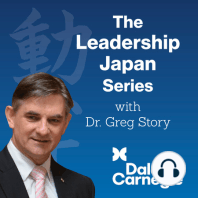9 min listen
378: How To Have Executive Presence
ratings:
Length:
14 minutes
Released:
Sep 23, 2020
Format:
Podcast episode
Description
Clients sometimes ask us to help their Japanese executives have more “presence”. This is rather a vague concept with a broad range of applications. There is a relevant Japanese concept called zanshin ( 残心 ). A rather difficult term to translate into English, but when you see it, you will recognise it. In Karate we do the predetermined, specified forms called kata (型). When someone is performing one of these kata, there are different points of emphasis and after the physical action is completed, there is a residual energy and intensity of commitment that continues. It is the same in the kumite (組手) or free fighting. After a powerful punch or kick is completed, the karateka keeps driving their energy, intensity and focus into their opponent. In business, we call this intensity “executive presence” but usually without the concomitant violence. When the executive makes a comment, there is an energy that remains after they have stopped speaking and the audience feels that intensity. We also call this having gravitas. Emilio Bortin was the CEO of the Santander Bank, which was a shareholder in the Shinsei Bank, when I was an executive there. He was visiting Japan to check on his investment and we were assembled to give him a presentation on what was happening with the Retail Bank. He was a broad shouldered but not so tall man, but when he entered the meeting room, he was like a Spanish Bull entering the arena, looking for a matador to emasculate. He completely filled that large room with his presence. It was absolutely palpable. He hadn’t even said a word, yet you felt his energy, intensity, determination, passion, strength and confidence. He was radiating zanshin - “presence” big time. “When I am a billionaire like Emilio baby, I will have presence too”, you might be thinking. So, did he get presence when he became a billionaire or did he become a billionaire, because he had presence? We know it was the latter. Right, very good, but how do we aspirant billionaire punters get executive presence? The energy being pumped out is a big factor. Low energy, low intensity people have zero zanshin and so zero presence. Softly spoken people can have presence too I guess, but frankly, you just don’t meet too many of those. There is a vast difference though between being raucous and loud and having presence. Being loud is basically just annoying. To have presence, your vocal strength and your body language must both be engaged at a higher than normal level. In casual conversation we speak at a certain level of intensity, usually fairly mild. When we are in a meeting or presenting, we need to ramp that up by at least 20%. When I am teaching participants in our classes to increase their vocal strength and speak more loudly, they struggle. I say to them “double that energy” and they raise by 1%. They resist because they feel like they are screaming. However, when they see themselves on video, it just seems confident and credible, not loud. This is one element of having presence. Pauses, ma (間), are another critical element. This space between the phrases or sentences, allows the audience to actually distill what you are saying. When you rush the words together, each thought overwhelms the previous thought. Each successive idea canibalises its predecessor and so not much content is consumed in the end. Our messages, in effect, are competing with each other. We speak at a good pace, so that the energy button has been pushed, but we need to break the content down to smaller brackets, which people can more easily digest. We are not rushing, so it shows control and no pressure being felt. This emanates confidence. We hit key words for additional emphasis, rather than allotting equal importance to each word. This focuses the audience attention on what we want them to focus on, rather than trying to ask them to swallow the whole talk, in one gulp. This communicates “I am confident”. This level of contr
Released:
Sep 23, 2020
Format:
Podcast episode
Titles in the series (100)
6: Networking That Works: japan.dalecarnegie.com by The Leadership Japan Series
